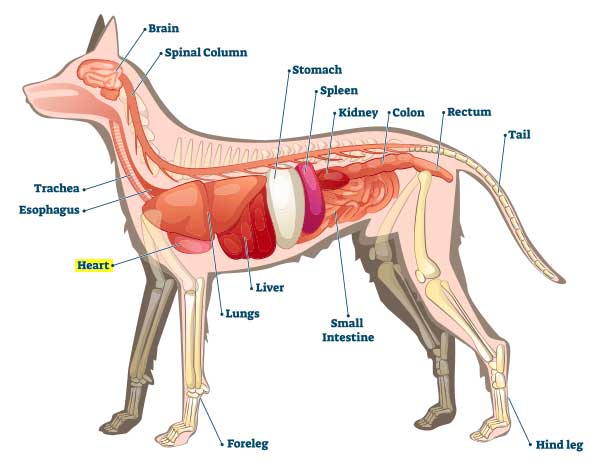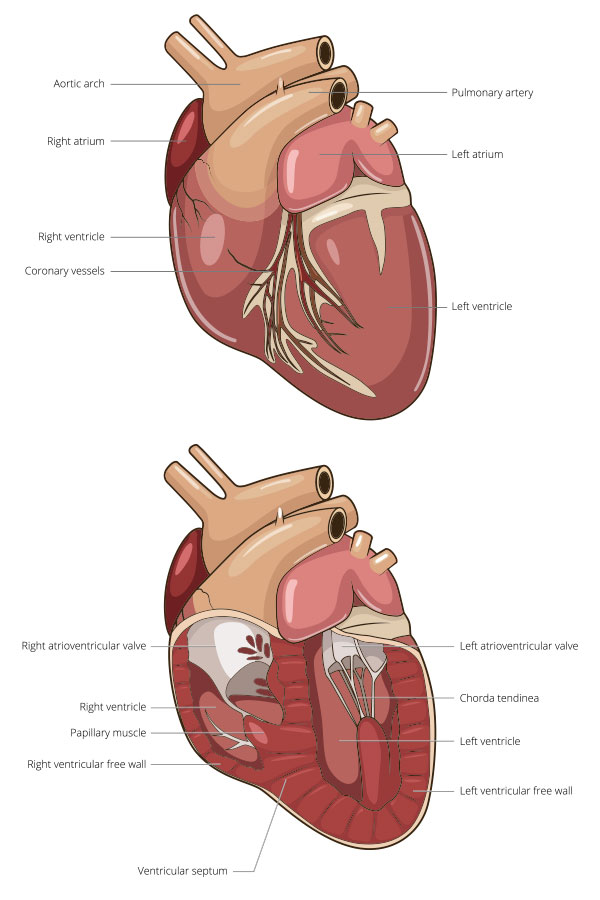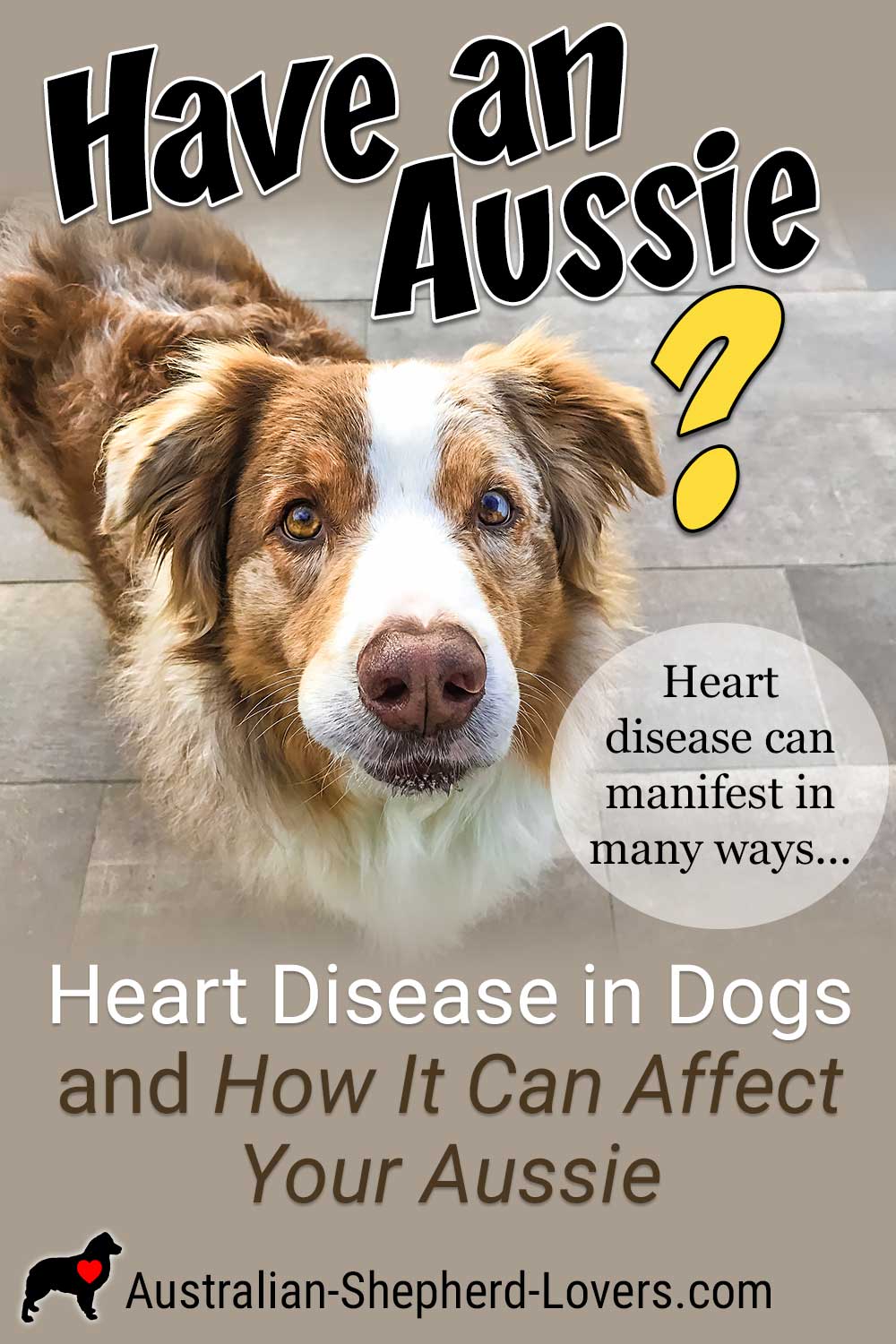
Heart Disease in Dogs and How It Can Affect Your Australian Shepherd
Heart disease in dogs is a serious problem, much like it is for their human counterparts. As with humans, heart disease can manifest in many different ways and, in most cases, it will have little or no symptoms until it reaches a serious degree. It strikes across all breeds and can occur at any stage in life, although the majority of cases occur with advanced age.
In general, there are two specific categories of canine heart disease: congenital or acquired. Congenital defects or diseases are conditions that a dog has from birth, while acquired conditions occur as a result of the normal wear and tear of aging. Acquired heart disease is much more common, accounting for about 95% of all diagnosed cases.
Though they are very active and healthy dogs, Australian Shepherds do have a tendency toward a specific type of congenital heart disease, called Patent Ductus Arteriosus (PDA). PDA is a heart defect that occurs when the ductus arteriosus, a shunt between the aorta and pulmonary artery, fails to close after birth. It can lead to an enlarged heart or congestive heart failure if not surgically treated.

cindy walsh/EyeEm / stock.adobe.com
It's important to know the causes and symptoms of heart disease in dogs so you can take precautions and start treatment as early as possible.
Other Types of Congenital Heart Disease in Dogs
Other types of congenital heart disease in dogs include the following:
- Congestive Heart Failure – a condition which can affect both sides of the heart and occurs when a dog's heart has trouble pumping blood properly. This can result in a buildup of fluid and pressure in the heart, impairing the dog's ability to breathe.
- Canine Dilated Cardiomyopathy – a disease that affects the cardiac muscles and inhibits the heart's ability to pump. This condition can be genetic but it can also be caused by other factors including nutrition and infections. It is most common among Boxers, Cocker Spaniels and Great Danes.
- Pulmonic Stenosis – a heart defect that restricts blood flow between the heart and lungs. It occurs most often in Jack Russell Terriers, Samoyeds, Boston Terriers, Bulldogs, Boxers, Newfoundlands, and Labrador Retrievers.
Acquired Heart Disease in Dogs
Occurring most often in middle and old age, acquired heart disease in dogs usually develops gradually over time. Specific types of acquired heart disease include:
- Canine Valvular Disease – weakening of the heart valves that leads to leaking.
- Arrhythmias – these are irregular heartbeats that occur as the result of a disruption in the dog's electrical system, which prevents it from properly communicating with the cardiac system.
- Pericardial Disease – a condition that occurs when the sac around the heart fills with fluid and affects the dog's heartbeat.
Symptoms of Heart Disease in Dogs
Though it can take a long time for heart disease in dogs to develop, there are certain symptoms you can look for that may provide a warning of cardiac troubles. These include:
- Dry cough following physical activity or exertion or intensifying at night
- Shortness of breath or elevated breathing
- Restlessness when sleeping
- Rapid weight loss, over a period of just a few weeks
- Fainting
- Potbelly caused by fluid buildup
- Rapid tiring or fatigue
If you suspect cardiac problems, you should take your dog to the vet for a proper evaluation. The vet can use various methods, including x-rays, echocardiogram, electrocardiogram, cardiac catheterization, and blood and urine tests to diagnose heart disease in dogs.
Wide Range of Treatments for Canine Heart Disease
As with humans, there can be a wide range of treatments for canine heart disease, including dietary adjustments, prescription medications or supplements. In cases that don't respond well to this type of management or more severe conditions, surgical intervention may be necessary. The method of treatment will vary depending on the specific condition and the individual dog.
Medications to Treat Dogs With Heart Disease
Many of the same kinds of medications prescribed for humans are used to treat heart disease in dogs. These can include an angiotensin converting enzyme inhibitor or ACE inhibitor, which works to reduce the stress on the heart, reduce pressure and blood volume. Beta blockers, nitroglycerine and digitalis can also be prescribed.
While these medicines are the same as those used on humans, the dosage differs drastically so you should never just give your own medication to your dog. It is vital that you get a proper diagnosis by a veterinarian, who will also be able to prescribe the correct dosage for your dog, depending on his breed, size, age and other factors.
While Good Nutrition Is Always Recommended, Exercise May Need to Be Modified and Monitored After Diagnosis
Of course, dogs can benefit from a healthy diet and proper exercise as well. This is especially true for Aussie's and other breeds that have a natural tendency toward obesity, which is a major contributing factor to heart disease in dogs. It's important that your dog get a balanced diet with all of the proper nutrients and you can bolster his diet with supplements including Taurine and Omega 3 Fatty Acids to help improve heart health.
Getting plenty of exercise is also important to maintaining good cardiac health. That can be more of an issue with some breeds than others and is usually not a major problem for breeds like the Australian Shepherd, but it's still a good idea to ensure that any dog is getting plenty of regular activity to keep the cardiac system functioning properly. However, if your dog has been diagnosed with heart disease, you may actually need to limit strenuous activity and carefully monitor him after any activity for signs of trouble.
Heart disease in dogs is a common problem, and with some types of disease being congenital it may be impossible to prevent it entirely, but with the proper steps including a healthy diet and exercise it is certainly possible to help your furry friend avoid any serious complications. If you do suspect any signs of heart disease, talk to your vet and get a proper diagnosis and treatment plan. Together, you and your pup can get on the road to a heart healthy life.
For more information about Australian Shepherd health issues see the Australian Shepherd Health & Genetics Institute (ASHGI).
Have Dog Training Questions?
Check out these introductory dog training videos...
I want my dog to stop being aggressive.
I want some help training my new puppy.
I want my dog to stop barking at everything.
Get Australian Shepherd Info, Website Updates, Special Offers, and Cartoons...
FREE GIFT
You'll also receive a free copy of the ebook
My Everyday Dog Training Tools
by professional dog trainer Daniel Abdelnoor, "Doggy Dan"












